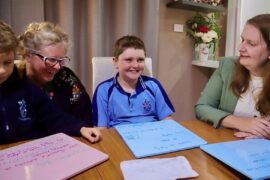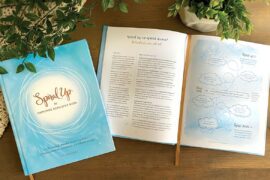I started by finding the generosity in me that she needed and accepted some things would need to wait – like housework or emails. I found my tears about the “me time” I craved and surrendered to the sacrifices that come with being a parent. I worked hard at not rushing her, having warmth and delight as I put her to bed, sending her a genuine message that I loved being with her. When the desperation would sneak in on me again I would remind myself that I could sleep all I wanted when she eventually left home or when I was dead.
Instead of expecting her to say goodnight and “see you in the morning”, I moved to make our separations shorter. I told her I would check on her in five minutes and that she could listen for my footsteps in the kitchen or for the sound of my voice. I always returned as I had promised full of more kisses while reminding her of the plans for the following day. I would tie invisible strings between our beds and tell her she just had to tug on them if she needed me. I told her I visited her in the night and watched her sleep. I once kissed her cheek with lipstick when she was sleeping but she told me in the morning, “I don’t like it when you make my face all messy!”
The biggest separation a child faces in the day is bedtime – not school or even when we are at work. We think because we are all in the same house they feel connected but sleep represents a long separation – up to ten hours of unconsciousness where they can feel very far away from us.
I even experimented with putting things under her pillow to find in the morning like treasure. She enjoyed the picture books most of all, running to read them together in our cuddle time. However, she was not happy with me when I left a pair of her favourite princess underwear under her pillow to wear. I tried many things – some worked and some did not but the message slowly got through. I worked hard to build a bridge from bedtime to the morning, conveying I was holding onto her so that she could let go of me. Instead of saying goodnight I tried to point her face into the next hello. I aimed to sooth her alarm system that had become activated by separation. I created pit stops for her to anticipate, breaking the ten hours of separate space into bite size pieces she could manage. We both started to sleep better as a result.
As I took the lead in navigating us through the bedtime separation my daughter grew more confident that this was my job and not hers. While singing her to sleep one night she looked at me and said, “Mama, no offense, but I can’t sleep when you are singing to me. Can you go now?” I stifled my laughter and said, “I’m sorry honey, have I been keeping you awake all this time?”
Originally published HERE.
Deborah MacNamara is a clinical counsellor and educator, on faculty at the Neufeld Institute and author of Rest, Play, Grow – Making Sense of Preschoolers (or anyone who acts like one). She has more than 25 years experience working with children, youth, and adults and speaks regularly about child and adolescent development to parents, childcare providers, educators, and mental health professionals. Please see www.macnamara.ca for more information.










